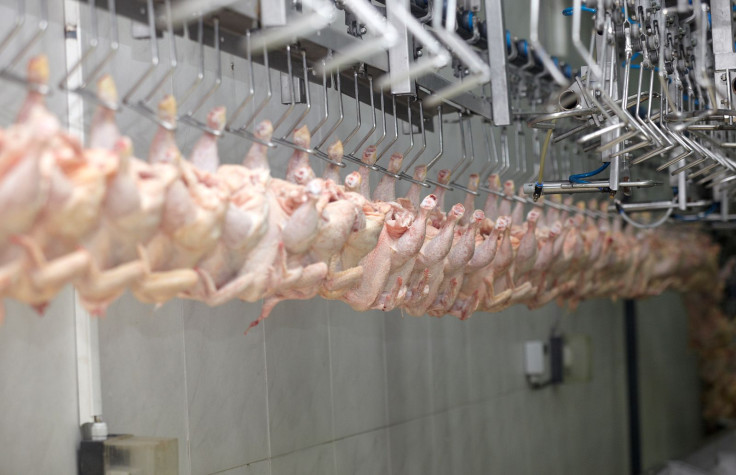60% Of Poultry Workers Report Pain, But USDA Considers Speeding Up Lines In Effort To Save Money

The safety of workers is a topic of concern for all, not just supervisors and bosses.
In April, the United States Department of Agriculture (USDA) and the White House proposed new poultry inspection rules that would allow many plants to speed up processing lines. The change is projected to phase out 800 inspection jobs and save around $95 million over three years.
"We think it's a bad idea," said Tom Fritzsche, a staff attorney at the Southern Poverty Law Center, which handles many poultry worker cases. "The most common complaint workers have is that the lines as they go right now are already too fast."
Studies have been done on poultry processing plants in North Carolina, South Carolina, and Alabama. Each study showed how plant owners were increasingly driven by greed instead of worker safety. The South Carolina study even found that 42 percent of workers developed carpal tunnel from working at the plants.
In the study at the Alabama poultry plant, researchers found that workers did not work passed their first shift, as they were required to hang at least 55 to 60 chickens in one minute, in order for the fast-moving plant to operate efficiently. As if one chicken a second were not intimidating enough, with USDA inspectors out of the picture, the proposed rule would allow some plants to move from a maximum of 70 to 140 birds per minute.
The National Institute for Occupational Safety and Health (NIOSH) studied a South Carolina plant and worker's likelihood of developing debilitating illnesses. Out of 318 workers, 10 percent developed carpal tunnel syndrome and eight percent developed tendonitis in their hands or wrists. In lieu of a diagnosis, 67 percent of workers reported pain In the hands and wrists, which can be indicative of future development of tendonitis and carpal tunnel syndrome.
Carpal tunnel and tendonitis are severe afflictions of the hands, arms, and wrists. Carpal tunnel syndrome is best explained as nerve damage caused by repetitive movements. This happens outside of poultry plants, especially among those who work at computers for much of their day. Symptoms start out as pain in the wrists and hands but can escalate to numbness in the arm as well as sharp pains during use. Tendonitis is an inflammation or irritation of tendons in the arms and wrists. Debilitating pain from the tendon's overuse can be a symptom of tendonitis. These muscular issues greatly reduce the quality of life among poultry plant workers, and speeding up their process could considerably worsen their quality of life.
The National Center for Farmworker Health also performed a study in a North Carolina poultry plant to determine the quality of work among workers and what speeding the plants could mean. The study was done in 2006, before the rules about speed ups were passed. Researchers found that many workers suffered chronic pain to their arms and hands, while 48 percent had headaches as a result of working and 46 percent had pain in their arms, hands, neck, and back. This comes out to 60 percent of workers in pain each day.
Most shockingly, when interviewed, only 19 percent of the workers felt that their supervisors were doing their best to ensure workers' safety while 65 percent felt that supervisors wanted to make the job they were doing fast and cheap at any personal cost to the workers.
Researchers reckon more data should be found, but it is clear that occupational health is at risk in poultry plants without the near impossible speed up; could the speed up rules put workers at risk for more than carpal tunnel?
Sources: Quandt SA, Grywacz JG, Marin A, et al. Illnesses and Injuries Reported by Latino Poultry Workers in Wester North Carolina. American Journal of Industrial Medicine. 2006.
Musolin K, Ramsey JG, Wassell JT, Hard DL, Mueller C. Muskuloskeletal disorders and traumatic injuries among employees at a poultry processing plant. National Institute for Occupational Safety and Health. 2013.



























